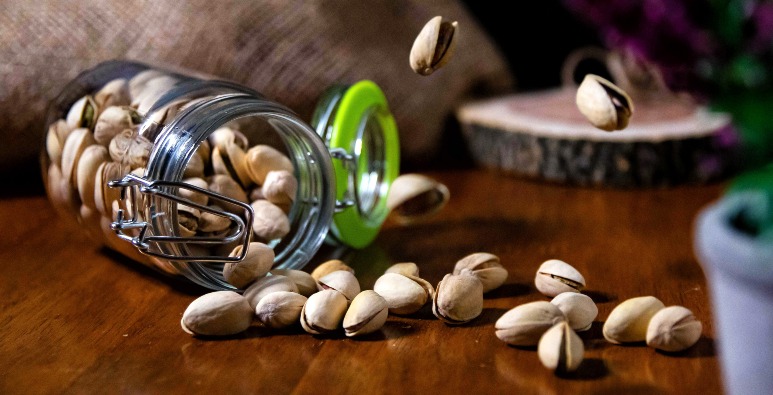Especially with the increasing trend of plant-based diets or raw foods, nuts have gained attention with their proposed health benefits. Pistachios are one of the healthiest tree nuts whose global consumption has increased significantly in recent years.
Researchers say that pistachios may help to lower blood pressure, among many other health benefits.
Pistachio nuts are one of the highest sources of healthy (unsaturated) fatty acids, potassium, vitamin E and beneficial plant compounds, such as phytosterols and carotenoids.
These vitamin, mineral and antioxidant properties of pistachios help to lower blood pressure. Besides, regular consumption of pistachios may help reduce heart-related health problems, diabetes and high blood cholesterol levels, according to scientific studies.
Let’s examine the effect of pistachios on high blood pressure in more detail.
Why is High Blood Pressure Dangerous?
According to the National Health Service (NHS) of the United Kingdom, untreated high blood pressure can increase the risk of heart disease and stroke.
Blood pressure is a medical measurement that shows the force against the heart to pump blood through the body (called systolic pressure) and the resistance of the blood vessels against the blood flow (called diastolic pressure).
If your numbers are consistently higher than 140/90 mmHg (systolic/diastolic), you might be diagnosed with high blood pressure.
The following conditions can occur as a result of high blood pressure.
- Heart diseases (including heart attacks and failure).
- Diabetes
- Strokes
- Kidney diseases
- Vascular problems
Do Pistachios Help to Lower Blood Pressure?
Pistachios are ancient tree nuts commonly consumed in Asia and the Mediterranean region. These healthy nuts are an excellent source of protein, especially for vegans who don’t get protein from animal products {1, 2}.
The fatty acid composition and bioactive antioxidant properties, fibre, potassium, magnesium and many vitamins found in pistachios are the main sources of pistachio benefits on human health.
Helping to lower high blood pressure is a very important health benefit of consuming pistachios.
In fact, almost all types of tree nuts have been shown to help lower blood pressure, however, pistachios seem to have the strongest effect in reducing blood pressure, according to a review and scientific analysis of 21 clinical trials.
Here is what science has to say about pistachios’ effect on blood pressure:
Studies on Pistachios’ Effects on Blood Pressure
A report from 11 studies, examining the circulatory system effects of pistachio, found that pistachio consumption reduced systolic blood pressure significantly. The consumption differed from 40 gm to 80 gm among the studies, which means 1 or 2 handfuls of pistachios. Researchers discovered that pistachios could also lower fasting blood sugar, blood cholesterol, and insulin levels. These are important risk factors for high blood pressure. By improving these conditions, pistachios help contribute to blood vessel and heart health.
There is another meta-analysis study published in the British Journal of Nutrition in 2021 that includes 13 different studies. This study found that pistachio consumption may decrease systolic blood pressure.
Researchers held an interesting study to observe the effects of a diet containing pistachios on stress-related hypertension (high blood pressure) compared to a normal diet without pistachio. They examined the blood pressure response against mental stress (complex math problems) or physiological stress (cold weather). The results showed that pistachio consumption lowered systolic blood pressure and the resistance of vessels to blood flow under stressful conditions.
Another study found that while pistachio consumption decreases both systolic and diastolic blood pressure, it also shifts the dietary choices in a healthy way such as by increasing total dietary fibre intake and decreasing consumption of sugar and unhealthy types of fat. These findings suggest that pistachios can have positive effects on appetite control and eating behaviours.
Federation of European Nutrition Societies declared during the annual conference in 2019 that pistachio is a good plant-based snack for pregnant women to control appetite, body weight and blood sugar (glycemic control to prevent an incident increase in blood sugar). This may mean that pregnant women may prevent pregnancy-related high blood pressure (pre-eclampsia) and high blood sugar (gestational diabetes) by consuming pistachios in moderation.
Furthermore, pistachio consumption can help type 2 diabetes patients lower their blood pressure, fasting blood sugar and body weight. Note that high blood sugar levels, high blood pressure and high body index increase the risk of life-threatening health conditions for people with type 2 diabetes {3, 4}.
Nutrient Content and the Recommended Daily Amount of Pistachios
According to the U.S. Department of Agriculture, one serving of pistachios (28.35 g) contains forty-nine nuts.
Pistachios contain fewer calories with higher essential amino acids. And, they contain the highest amount of phytosterols and potassium compared to other nuts.
Potassium helps to ease tension in your blood vessel walls and thus plays a role in lowering blood pressure, according to the American Heart Association.
100 g of pistachios contains;
- 560 kcal,
- 16 g protein,
- 32 g fats,
- 1025 mg potassium
- 214 mg phytosterols
To obtain maximum benefit from pistachio you can consume 1 serving (nearly 40 gm) of pistachio per day. Studies also showed beneficial effects with the higher amount but you shouldn’t forget that nuts such as pistachio have a high amount of calories. If you cannot balance your dietary energy intake, you may gain weight as a result.
Before You Consume Pistachios…
Pistachio is a very healthy nutritional source to be included in diets, however, there are some factors to consider:
- Salted pistachio cannot help…
In case too much salt, high-fat and sugar-containing sauces are used during the production of pistachio, these healthy nuts might worsen your blood pressure and other health problems such as blood sugar, weight gain or blood cholesterol. So how they are produced is a determinant factor in whether you will get benefits from eating pistachios.
- Excessive consumption might increase body weight…
As mentioned above, nuts are great nutrient and calorie sources in small amounts. However, people can easily lose control while they consume nuts as a snack. To prevent weight gain from pistachio consumption, portion control is important.
- Beware of Aflatoxins!
Aflatoxins are the main harmful chemical of fungi (toxin), which can cause liver damage or physiological damage events in the body. Like other foods, pistachio may be contaminated by these toxins.
The Food and Agriculture Organization of the United Nations (FAO) indicated that 25% of food might be contaminated by toxins of fungi (mycotoxins). This leads to several health problems and economic loss in the food industry. To avoid this toxin contamination, you should consider purchasing the brands that have quality control, and adequate production and storage techniques. Also, the hot weather is a risk for fungi growth. You should store pistachios in a dry and cool place {5, 6}.
Other Risk Factors for High Blood Pressure
There are some dietary or lifestyle habits that could increase blood pressure, such as;
- Obesity,
- Excessive salt consumption,
- Insufficient fruit and vegetable intake
- Sedentary life= not doing enough exercise
- Too much alcohol or caffeine intake
- Smoking
- Ageing
Conclusion
- High blood pressure is a common medical condition that affects general health.
- Pistachio is a beneficial nut to lower blood pressure and high blood sugar, blood cholesterols and body weight.
- Pistachio is a condensed nutrient and calorie source, so portion control is essential.
- Salted, sweetened or sauced pistachios may not show beneficial effects. Raw or roasted pistachio should be preferred.
- Production and storage conditions are important to avoid toxins.
Sevginur Akdas is a Clinical Dietitian, currently pursuing her PhD on metabolism, chronic diseases and clinical nutrition.
Sevginur has many publications with dozens of citations as a part of a research team.
She is also a professional health writer. Using her professional knowledge and exceptional research skills, she participated in academic book chapters.
Moreover, Sevginur wrote articles monthly as a columnist for Popular Science Magazine from 2017 to 2019.
To view the studies Sevginur has been involved in, you can click the following links: ResearchGate -- Google Scholar
Click here to see her full bio.

